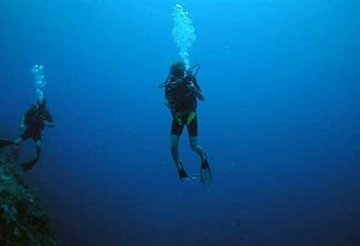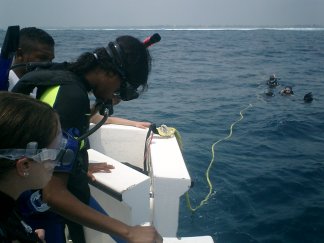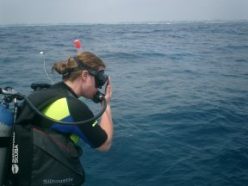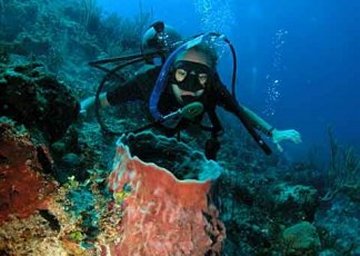The pressure of scuba diving
If done without proper precautions, scuba diving can be a painful experience.
By Emily Sohn
At 25 feet below the surface of the water, Alex Whitaker’s tooth started to ache. When he tried to dive deeper, the pain grew worse.
“It felt like my tooth was going to explode,” says the 17-year-old high school junior from Hackley School in Tarrytown, N.Y. Alex learned to scuba dive on a school trip to Belize and Guatemala. On a scale from 1 to 10, Alex says, the oral agony weighed in at an excruciating 9. “It was the most painful thing I’ve ever felt in my entire life,” he says.
 |
|
Scuba diving can drop you into a cool blue underwater world. It can also be a painful experience if you’re not careful.
|
| © Tim Calver |
Alex’s so-called tooth squeeze is just one of the unpleasant experiences that can happen to a scuba diver. On the same trip, Tommy Goff, 17, surfaced from his first open-water dive with a bloody nose that turned the inside of his mask red. Annie Brock, 17, had the same problem. She also suffered from ear pain all week, making it hard for her to descend.
I traveled with the group, too. And though my ears, teeth, and nose were fine, I had a few bouts of seasickness and post-diving fatigue that left me feeling dizzy and nauseous. A few students threw up over the side of the boat on one particularly rough day.
Scuba stands for “self-contained underwater breathing apparatus.” The diver wears all the equipment he or she needs to stay underwater.
Scuba apparatus includes a tank of compressed air toted by the diver on his or her back, a hose for carrying air to a mouthpiece, a facemask that covers the eyes and nose, regulators that control air flow, and gauges that indicate depth and how much air remains in the tank.
A diver who stays down too long, swims too deep, or comes up too fast can end up with a condition called “the bends.” In this case, bubbles of gas in the blood can cause intense pain, even death.
 |
|
Getting ready to go scuba diving.
|
| Emily Sohn |
“A friend of mine dove to 350 feet once,” says Dave Heaney, a diving instructor from Ft. Lauderdale, Fla. “He’s now paralyzed permanently from the neck down.” Dave met our group in Belize and gave scuba instruction to several of the kids.
Laws of physics
For the most part, scuba diving is a relatively safe activity—as long as you have a healthy respect for the laws of physics. Basically, it all comes down to pressure.
Even though you might not normally notice, air actually has weight. At sea level, 14.7 pounds of air press down on every square inch of your body. As you go up in altitude, you encounter less air and less air pressure. That’s why it’s harder to breathe on top of a tall mountain. In outer space, there’s no air at all, and astronauts have to wear spacesuits to keep from blowing up like a marshmallow in a microwave.
Underwater, the opposite happens. Water is nearly 800 times denser than air and much heavier. As you dive deeper and deeper, the force of all that water can do funny things to your body.
 |
|
Emily gets ready to take the plunge.
|
| Courtesy of Emily Sohn |
Ear pain is the most common problem, caused by an imbalance between air inside your ears and air outside your body. On an airplane or underwater, most people have to “pop” their ears to “equalize” the pressure. Equalizing is harder for some people than for others, especially when they have colds or sinus congestion.
Increased pressure underwater also affects how we breathe. At depth, pressure compresses the lungs. Divers take in more air as they descend, and their bodies absorb more nitrogen the deeper they go.
One possible consequence is called nitrogen narcosis. Below certain depths, confusion can set in. “I once had a guy who thought he was Superman,” Dave says. “He tried to climb a wreck but didn’t remember it later. He also tried to give his regulator to the fish.”
“The bends” are even scarier. As you come to the surface from a dive, nitrogen gas can bubble up in your body like carbonation in a freshly opened can of soda. If you swim up too fast, decreasing pressure makes the bubbles expand, which can cause severe pain in your joints and create other problems in your body. Without immediate medical attention, the bends can be fatal.
To avoid these perils, most divers use tables or small computers that calculate how long they can spend underwater at certain depths. On all 10 of our dives in Belize, we made sure to take a 3-minute safety stop at 15 feet, and we rested between dives to let some of the nitrogen ooze out of our bodies.
 |
|
Scuba diving can reveal a fascinating world of undersea creatures and formations.
|
| © Tim Calver |
As for Alex, he knew right away what was happening. He had been to the dentist just 2 months earlier to get a cavity filled, and there must have been a lingering air pocket in his tooth. He came up to the surface as soon as he felt pain. By the end of the day, the pain was largely gone.
Most of the other divers in our group emerged unscathed from their scuba-diving adventures. “I thought it was the most incredible thing I’ve ever done,” says Eliza Murray, a 17-year-old Hackley junior. “It was more relaxing than anything I’ve done before.”
Which goes to show that physics can be a drag—but it doesn’t have to hurt!
Going Deeper:







